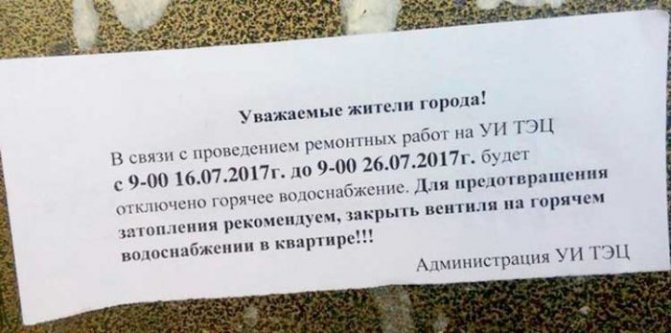Permissible duration of utility outages
Duration of disconnection of utility services
When providing utility services with interruptions exceeding the established duration, the amount of payment for each utility service is also subject to reduction in the amount of utilities not provided. The main regulatory document regulating the relationship between the subjects of the process of providing hot water supply is the Decree of the Government of the Russian Federation “On the provision of utility services to owners and users of premises in apartment buildings and residential buildings” dated 05/06/2011. No. 354. According to this resolution, namely Appendix No. 1, a list of situations is established when utilities can be disconnected:
— Allowable duration of interruption in cold water supply: 8 hours (total) for 1 month; 4 hours at a time, in case of an accident in centralized cold water supply networks in accordance with the requirements of the Russian Federation on technical regulation (SNiP 2.04.02-84).
— Allowable duration of hot water supply interruption: 8 hours (total) for 1 month; 4 hours at a time, and in case of an accident on a dead-end main - 24 hours, the duration of the hot water supply interruption associated with repair and maintenance work is carried out in accordance with the requirements of the legislation of the Russian Federation on technical regulation (SanPin 2.1.4.2496-09).
— Allowable duration of water supply interruption: 8 hours (total) for 1 month; 4 hours at a time (including in case of an accident).
— Permissible duration of gas supply interruption: no more than 4 hours (in total) for one month.
— Permissible duration of heating interruption: no more than 24 hours (in total) within one month; no more than 16 hours at a time - at an air temperature in residential premises from 12 degrees C to standard; no more than 8 hours at a time – at an air temperature in residential premises from 10 degrees C to 12 degrees C; no more than 4 hours at a time - at an air temperature in residential premises from 8 degrees C to 10 degrees C.
As a rule, all the dissatisfaction of residents of comfortable apartments is caused by rather long periods of preventive maintenance. According to paragraph 10 of this Procedure:
When providing utility services, breaks to carry out repair and maintenance work, as well as work to connect new consumers, are allowed after prior notification (in writing) to the consumer in the manner prescribed by these Rules. The duration of these breaks is established in accordance with these Rules and other requirements of the legislation of the Russian Federation. Interruptions due to natural disasters and emergencies are also permitted.
Other requirements of the legislation of the Russian Federation mean regulations that ensure sanitary and technical requirements (control over which is established in accordance with Articles 12, 13, 14 of the Housing Code of the Russian Federation), namely:
1) Rules and regulations for the operation of the housing stock, approved by Decree of the State Construction Committee of Russia No. 170 of September 27, 2003: Repair of heating networks, heating points and heat consumption systems should be carried out simultaneously in the summer. The recommended repair period associated with the cessation of hot water supply is 14 days. In each specific case, the duration of repairs is set by local governments.
2) Hygienic requirements for ensuring the safety of hot water supply systems, approved by the Resolution of the Federal Service for Supervision of the Protection of Consumer Rights and Human Welfare (Chief Sanitary Doctor of the Russian Federation) No. 20 dated 04/07/2009: During the period of annual preventive maintenance, hot water supply systems should not be turned off exceed 14 days. During the repair period, facilities of increased epidemic significance (hospitals, boarding schools, school and preschool institutions, etc.) must be provided with hot water from their own backup sources, which should be provided for at the project development stage.
Moreover, if in the first normative act it is allowed to exceed the period for carrying out preventive work by more than 14 days, then in the second normative act this period is clearly established.
A planned shutdown of utilities, in accordance with clause 49 of the Procedure, must be accompanied by notification to consumers no later than 10 working days before the start of the break.
The implementation of state control over the compliance of residential premises, quality, volume and procedure for the provision of utility services, regardless of the form of ownership, is carried out by executive authorities of the constituent entities of the Russian Federation (in accordance with Article 13, Article 20 of the Housing Code of the Russian Federation). Control over compliance with the procedure for the provision of utility services is carried out by executive authorities of the Russian Federation, executive authorities of constituent entities of the Russian Federation and local government bodies within their competence (in accordance with clause 114 of the Procedure).
Therefore, you can contact the following authorities regarding this matter (you can also see contacts on our website):
1) District administration;
2) Department of Housing and Communal Services;
3) State Housing Inspectorate;
4) Office of the Federal Service for Supervision of Consumer Rights Protection and Human Welfare;
5) Prosecutor's office (district, regional).
Who should be held accountable for these violations? To do this, it is necessary to determine who is the contractor providing hot water supply. Depending on how you manage your home, there may be several options:
1) Your home is maintained by a management company. In this case, the management company is the executor, and responsibility for the provision of hot water supply lies with it, regardless of whether it produces or acquires utilities. In practice, very often management companies explain the absence of their fault, however, according to the Procedure, they are the executor who is responsible for the entire process of providing utility services. And it is they who must answer.
Management companies like to refer to the debt of consumers, however, according to clause 80 of the Procedure, in order to suspend or limit the provision of utility services, it is necessary to have a debt of 6 monthly payments, determined based on the relevant standards for the consumption of utility services. In this case, the contractor is obliged to notify in writing one month in advance of such a disconnection, otherwise the disconnection will not be carried out. In addition, the contractor, in accordance with clause 85, clause 86 of the Procedure, cannot turn off hot water to consumers who fulfill their obligations. That is, if your neighbor improperly fulfills his obligations (for example, does not pay housing and communal services on time), then you do not have the right to turn off the hot water and refer to this neighbor.
2) If you have an HOA or housing cooperative, then responsibility for the failure to provide hot water supply lies with the governing bodies.
In practice, disconnections often occur when some consumers fail to pay their debts for housing and communal services. In this case, HOAs and housing cooperatives are a single consumer and are liable for their debts in full. In the first option, we have already discussed how hot water should be suspended or limited. At the same time, paragraph 86 of the Procedure does not clearly refer specifically to the consumer, but generally refers to the suspension or limitation of utility services. In addition, there is a review of the judicial practice of the Supreme Court of the Russian Federation for the 4th quarter of 2006, approved by the Resolution of the Presidium of the Supreme Court of the Russian Federation dated March 7, 2007 (issue 28), where HOAs and housing cooperatives were identified as an intermediary (since it is not a direct consumer) in the process provision of public services. Therefore, there is a rather difficult question here, how to position an HOA or housing cooperative, and whether it is possible to turn off bona fide payers in the event of debts of other residents.
Under what conditions is deactivation possible?
The management company turns off water based on certain principles that cannot be violated. The main conditions are the absence of:
Regardless of the circumstances, the disconnection procedure implies preliminary written notification to debtors of such intention at least twenty days in advance. When delivering a notification, it is important to take a signature from the defaulter stating that he actually received it, which is a certain difficulty, but if necessary, the management company finds a legal way out. For example, sending a registered letter with notification or even courier services.
Without official and timely notification, no one has the right to turn off anything. Turning off hot water completely, as mentioned above, is illegal, especially since employees of any institutions cannot violate the owner’s rights to the inviolability of his property and have no right to enter his home without permission. However, in practice, a separate apartment cannot be disconnected from hot water, since it is supplied through a common riser.
Reasons for turning off cold water supply
Most often, citizens can detect a lack of water for several reasons, these are:
- carrying out planned repairs in accordance with the approved schedule;
- unscheduled work in the event of an emergency in the intra-house system;
- repair of communications located outside the high-rise building.
If cold or hot water is turned off, citizens can call the dispatcher, and the responsible employee will report the reasons for stopping the supply of the resource and the approximate time frame for resuming the supply.
In addition, there are other situations when the water can be cut off:
- The water supply in one of the residential premises is in unsatisfactory condition. To avoid flooding of neighbors, temporary but urgent shutdown of utility systems and their repair are required;
- employees discovered an illegal connection to water communications. Unauthorized connection to the system is considered a violation of the law, and a fine is provided for this;
- Local authorities have issued an order to the utility service provider to stop water supply, and the latter is taking urgent measures to eliminate the identified violations.
In what cases can the water be turned off?
According to the law, utility workers can turn off water or heating in the entire house without warning only in two cases:
- if there is a threat of emergency situations on equipment or networks,
- in case of emergencies or natural disasters.
However, there are other situations when the management company has the right to limit the provision of utilities.
- In case of incomplete payment by the consumer for utilities. There are several nuances here. Firstly, the debt for one or more utilities must be at least 6 months old. A smaller amount of debt is not a reason to disconnect. Secondly, if the debtor has signed a debt repayment agreement and fulfills it, he also does not have the right to stop providing utilities. However, you should not violate the repayment schedule. One wrong step and you could find yourself without hot water.
- In the case of carrying out scheduled preventative repairs and maintenance work on intra-building engineering systems related to the common property of the owners of premises in an apartment building. First of all, we are talking about the traditional summer shutdown of hot water.
- If a fact of unauthorized connection of a consumer to in-house engineering systems is revealed.
- In case of receipt of a corresponding order from authorized state or municipal bodies.
- In the case of the consumer using household appliances with a power exceeding the technical characteristics of in-house engineering systems specified in the technical passport of the residential premises.
- In case the communications in your apartment are in unsatisfactory condition due to your fault. According to the law, we ourselves are responsible for the pipes and wiring in our apartments. That is, if there are any problems, it is our responsibility to call a technician and fix them, otherwise we will create a threat to the lives and property of other residents.
Keep in mind - in all these cases, the management company is obliged to warn you in writing about the planned shutdown 1 month in advance. And one more important point. You do not have the right to turn off cold water and heating for debts. Here is what government decree No. 307 says about this: “The contractor has the right to suspend the provision of utility services, with the exception of heating, cold water supply and sanitation.”
Permissible duration of cold water shutdown
Decree of the Government of the Russian Federation dated May 6, 2011 No. 354 regulates the norms and requirements for cold water in the event of planned and unplanned situations of interruption of water supply.
Based on this document:
- consumers are not allowed to be left without water for more than 8 hours within one month;
- A one-time shutdown of cold water is allowed for a maximum of 4 hours.
These standards are approved in case of scheduled repairs. If emergency situations arise, the resource supplying organization is obliged to eliminate breakdowns as soon as possible. For such cases, standards for damage elimination are established depending on the complexity of the situation, the depth of the pipeline, as well as other factors influencing the solution of the problem.
If planned events take longer, this indicates poor quality of service. In this case, the consumer may request a recalculation for the water consumed.
Citizens also have the right to demand a reduction in payment for services if the utility company does not comply with the contract for the provision of services. For example, if the pressure in the pipes has dropped by 25% or more.
The contract specifies the obligations of all parties that must be observed. The consumer must pay for the services received on time and in full. If he does not comply with this clause of the agreement, the resource supplying organization will charge penalties for late payments.
On the other hand, the supplier is obliged to fulfill its obligations regarding the quality of service provision. Therefore, any shutdowns of cold water must be carried out legally and carried out in accordance with established regulations and standards. The supplier will face financial sanctions for violating the contract.
We list the cases considered illegal:
- scheduled technical work is being carried out, but residents were not notified about this;
- Utility debtors had their water turned off for non-payment. This is illegal, in this case the organization must resolve the issue only by legal means, for example, charge penalties for non-payment, or go to court to resolve the problem;
- the supplier stopped supplying cold water or reduced the supply pressure without legal grounds for doing so;
- After troubleshooting (planned or emergency), the water was turned on for unknown reasons.
Nuances of turning off water with and without warning
Having considered how long hot water can be turned off by law, it is worth mentioning that there are nuances in this issue. For example, in winter, no management company has the right to carry out repair work unless required by law. Most often, such measures are associated with an emergency situation. According to the law, during an emergency, you can turn off the water supply for a maximum of 2 days, but no more.
There are also specific deadlines for sending notice of planned termination and the responsibilities of individuals. If the housing office has arbitrarily turned off the hot water supply, then a person can complain not only to Rospotrebnadzor, but even write to the prosecutor’s office.
The state always stands for consumer protection and there are certain rules prescribed by law that not only officials, but also citizens are required to follow.
Deadlines for sending notice of water shutoff
Suspension of water supply according to the plan must be accompanied by a warning to all residents. This is required by paragraph No. 49 of the rules for the provision of housing and communal services. Citizens are notified ten days before the start of repair or maintenance work.
The right to stop water supply is stated in Article 21 of Federal Law No. 416. An exception is considered an emergency situation that does not depend on utilities or other structures.
Responsibility for violation of the rules of procedure
There are rules that even government authorities cannot violate without a good reason. Individuals and officials are responsible for this. Provisions that cannot be ignored are spelled out in Federal Law No. 416.
The main points for which responsibility is imposed:
- Poor water quality or interruption of supply.
- Insufficient water supply.
- Damage caused to residents or their property after an outage.
- Unauthorized connection to the network.
- Violation of a contract for the supply of a resource or causing moral harm.
Please note: such actions are prosecuted by law and are subject to penalties. In some cases, criminal liability is possible.
Emergency shutdown of cold water
If a breakdown is detected in the water supply system, the resource supplying organization is obliged to take immediate measures to identify the causes. Utilities are also obliged to eliminate violations and carry out repairs as soon as possible. All efforts of the organization must be aimed at eliminating the accident. The time to solve the problem and carry out repairs is regulated by SNiP 2.04.02-84.
Reasons for an emergency shutdown of water supply, in addition to a pipeline break and other damage to the system:
| Reduced quality of drinking water | In such a situation, water supply will be resumed only after the problem has been completely eliminated. Since these indicators affect people’s health, therefore, this measure is completely justified. |
| To extinguish fires | During firefighting periods, increased volumes of water are required to eliminate the problem as quickly as possible. Water must be provided immediately after the fire has been extinguished. |
During the period of restriction of water supply through the central system, the utility organization is obliged to provide a supply of drinking water in special automobile tanks. The volume of water should be delivered taking into account consumption standards per person. But there is one drawback - the time for water delivery is not specified.
At the same time, during planned outages, utility companies warn consumers in advance about the outage. Citizens have time to prepare for the shutdown; they stock up on their own. In this case, drinking water tanks will deliver liquid only if the planned work lasts more than a day. In emergency situations, the organization is obliged to ensure the supply of water to meet the daily needs of citizens.
Recalculation of the fee when the cold water supply is turned off
The service provider can recalculate receipts up or down. In the event of a shortfall in resources due to a water outage, consumers have the right to demand recalculation.
To do this, citizens must write an application and reflect:
- a request to reduce the amount indicated in the invoice for services provided;
- draw up your calculations with references to current standards;
- your arguments for recalculation;
- If there is documentary evidence, attach copies of available papers.
No cold water: shutdown schedule for 2015
Water is a natural resource without which no person can live. A centralized supply of cold water is present in almost every residential building in Russia.
The supply of cold drinking water is included in the list of provided utilities. According to the laws, the provision of cold water at the normal level must be in all residential premises. It turns out that the supplier often does not fulfill his responsibilities one hundred percent. Almost every summer we can observe a decrease in pressure or a shutdown of water for a long period.
Few citizens dare to find out in detail the cause of the problem, while constantly complaining about the quality of service. Unscrupulous cold water suppliers take advantage of inaction on the part of residents. There are increasingly frequent complaints that water supply occurs at low pressure and there are long-term shutdowns without prior warning. In this article we will look at what to do if there is no cold water or the cold water supply is turned off for non-payment or for unknown reasons.
If you want to find out how to solve your specific problem, please contact the online consultant form on the right. It's fast and free! Or call us at 8(800)-350-30-02 (the call is free for all regions of Russia)!
Reasons for de-energizing DHW and cold water supply
Most often, the consumer does not know that the water supply is planned to be cut off. Moscow is a big city and cases often occur when the supply of hot water and cold water is carried out unscheduled. This may be due to an accident or emergency repair. In any case, the citizen suffers first and often does not know who to call in Moscow if there is no water.
There are emergency reasons that do not require warning. However, even for such cases, specific periods of time are prescribed during which utility companies must correct the situation. Utilities are required to comply with water shutoff standards and report in advance about an unscheduled interruption in the supply of the resource.
No housing office or management company has the right to schedule shutdowns for the autumn, spring or winter periods. This is why there is summer, when people go on vacation and stopping the supply of hot water will not cause serious inconvenience.
To find out the reason why there is no hot water, in Moscow in 2021 you need to call the emergency line at the number: 8-800-700-40-70. The cool center operators will indicate the reasons for the lack of water supply.
The following situations are common:
- accident;
- carrying out major repairs;
- pipe cleaning;
- connecting new facilities;
- problems with housing and communal services.
Note: utility companies are required to notify users 10 days before the start of work. The only exceptions are emergency situations.
Watch the video: “Where to complain if the water in the house is turned off outside of the plan.”
Regulations for the supply of cold water in the apartment
The basic rules and requirements for providing cold water supply are described in Russian Government Decree No. 254 of 05/06/2011. This document contains the rules for providing communal property to residential property owners.
According to the law, the supply of cold water in residential premises must be uninterrupted.
There are acceptable standards for turning off cold water:
- over the course of 1 month, the maximum amount of shutdown time should not exceed 8 hours;
- When eliminating the accident and carrying out preventive work, the water can be turned off continuously for no more than 4 hours.
Rules for the provision of water supply services
What does the legislation say, how long can the water supply be turned off according to the law? The official resolution outlines the main conditions and rules for the provision of cold water. An agreement between the management company and the supplier must be signed. Moreover, this needs to be done for both water supply and sanitation.
In such agreements, it is necessary to highlight the following important parties:
- Volume of liquid, its pressure in the pipeline;
- Delivery time;
- Fluid quality and constant monitoring;
- Conditions under which the cold water supply may be temporarily turned off or limited.
The conditions under which cessation of water supply without warning is permitted can only be accidents. The time it takes to resolve an emergency depends on the severity of the problem and the depth of most pipes, but it should not last more than one day.
In other cases, owners cannot be without water supply for more than four hours per day and eight hours per month, in general terms. At the same time, the supplier and the company must notify everyone about water outages.
What cases of turning off cold water supply are considered illegal?
There are a number of cases when turning off cold water is considered illegal:
- Shutdown during scheduled maintenance without prior notification to residents.
- Disconnections for non-payment in the absence of debts.
- Stopping or decreasing water pressure for no apparent reason.
- Delay in water supply after troubleshooting.
In cases where a water shutoff occurred due to one of the above points, it is necessary to send a written application to the organization providing utility services (MC, HOA). This application must describe the existing problem and request that the issue be resolved. The period for consideration of applications is 1 calendar month. If, after consideration of the application, the requirement is not eliminated, the consumer may contact the state control and supervisory authorities. When contacting higher authorities, you must have a copy of the application to the management company or homeowners association.
What to do and where to go if cold water is turned off illegally?
If residents believe that stopping the water supply has no legal basis, it is necessary to take the following advising measures:
- Submit a written application setting out the requirement to restore the water supply. In this case, the letter must contain a request to recalculate the amount during the shutdown.
- If, after three days, the water supply has not been restored, you must send a claim to the Prosecutor's Office and Rospotrebnadzor, or file a lawsuit. In this case, it is worth paying attention to the package of documents, which should contain maximum evidence of the violation: photo; video; inspection report, etc.
The proposed actions will help you correct the problem in question by returning the provision of this service to your apartment.
How long can water be turned off by law?
How long can there be no cold water? The standards for shutting off the cold water supply may differ depending on the number of people living in the locality.
According to SNiP, water supply systems are divided into 3 categories:
- Communications in populated areas of more than 50 thousand.
- Communications in populated areas ranging from 5 to 50 thousand.
- Communications in populated areas of up to 5 thousand.
An interruption in water supply in cases of disconnection of damaged communications or switching to backup ones for the first category is no more than 10 minutes, for the second category no more than 6 hours, for the third no more than 24 hours.
Any repair work must be carried out within 1 day. If cold water is unavailable for longer, then on that date the payment rate will be reduced by 0.15 percent.
During planned work, the cold water shutdown schedule for 2015 should be posted at each entrance of the house and in the management office itself so that residents are aware and prepared.
What to do and where to call if there is a long absence of water for unknown reasons
The first person to be notified of a lack of water is the emergency dispatcher. If utility services do not know the causes of the breakdown, then the dispatcher is required to create a request for consideration. The applicant must write down the application number for himself. Within 24 hours, the supplier is obliged to notify the client about the progress of resolving the issue. If the situation does not become clear, then it is necessary to write a statement to the management organization. The further sequence of actions is similar to the procedure described in the previous section.
Water shutdown and warning about it

For all the reasons described above why the water supply is stopped, the organization must notify the water supply within the first 24 hours when the need to turn off arises. If the supply interruption is planned, then its date is announced in advance - a month before the shutdown.
The lack of water and the reasons for this unpleasant phenomenon must be explained by the management companies in whose department there are houses that were shut off. Relevant announcements are posted on information boards. They indicate the date, time of repair work, duration of the outage, as well as contact numbers of management company employees.
Representatives of the Management Company must provide all current information to residents calling the dispatch service. They can be found on the receipt. You can easily find out the latest information by calling the 24-hour central dispatch service of the water utility.
Reasons for turning off cold water
There may be several answers to the question of why there is no cold water. It is usually disabled for the following reasons:
- Previously planned repair work is being carried out. In this situation, residents of the house must be notified of upcoming events 10 working days in advance. The responsibility for notification lies with the management company;
- accident on internal communications;
- failure on networks outside an apartment building.
If unpredictable emergency situations occur, cold water is turned off without notification.
Useful
How long can cold water be turned off by law?
Temporary restrictions are established by law for planned and emergency water shutdowns. During one month, consumers can be left without water supply for a total of no more than 8 hours. The maximum duration of a one-time shutdown is 4 hours. This applies to all planned events.
In the event of an accident, water supply organizations must repair the breakdowns as a matter of urgency. In this case, the time standards will be different; they depend on the complexity of the accident, the depth of the pipelines and other factors.
If a planned shutdown of cold water occurs for a longer period of time, this indicates an inadequate quality of the services provided. In this situation, the citizen has the right to demand that the supplier recalculate payment for services.
A violation of the agreement on the supply of drinking water to apartments is not only its shutdown beyond the established time limit. This also includes reducing the pressure in the pipes. If it falls by 25% or more, then this also becomes a reason to recalculate the payment towards its reduction.
The consumer is obliged to regularly pay for water supply; violations are punishable by penalties and fines. At the same time, the supplier is also responsible for the quality of the services provided. All cold water shutdowns must be justified and carried out in accordance with the established procedure. Otherwise, the supplier will also face sanctions. There are a number of cases in which turning off water supply is considered illegal:
- planned technical work is underway, but residents have not received the necessary advance notices;
- the water supply is shut off for non-payment, even if there are actual debts. As we have already indicated above, drinking water cannot be turned off even for debtors. To combat them, utility companies must find other methods, for example, charging penalties and fines, going to court, limiting the supply of other resources;
- unreasonable interruption of water supply or reduction of its pressure in pipes;
- delay in turning on the water after the problems have been corrected.
Deadlines
Time limits are established by law for planned and emergency water supply outages. During one month, the client can be left without water for a total of no more than eight hours.
The maximum limit for one outage is four hours. This applies to all planned manipulations.
In the event of an accident, water companies must correct the problems within a short period of time. In this situation, the time standards will be different; they will depend on the complexity of the emergency situation, the depth of the pipelines, and so on.
If the planned shutdown of water supply takes longer than usual, this indicates an inadequate quality of the services provided. There is no need to think about when the water will be given and the water supply will be turned on; in this situation, you have the right to demand that the company recalculate payment for services.
Not only is it considered a violation of the agreement on the supply of drinking water to the premises if it is turned off beyond the established time frame. This can also include a decrease in pressure in the pipes. If it drops by 20% or more, then this also becomes a reason to recalculate the payment in terms of reducing it.
ATTENTION! The client must constantly pay water bills; for violations, he is punished with penalties and fines. At the same time, the company receives a share of responsibility for the quality of services provided.
If you're wondering. why the cold water was turned off, know that there is an answer to this question. All water supply shutdowns must have a reason and the process must be carried out in a certain order, otherwise the company will also face fines. There is a list of cases in which turning off water is considered illegal:
- Planned technical manipulations are being carried out, but residents have not received the necessary preliminary messages;
- the water supply was shut off for debt, even if there was a debt. As has already been said, no one should have their drinking water turned off. To deal with debtors, companies must use other methods, for example, accrue penalties and fines, apply to the courts, and limit the provision of other services;
- unreasonable termination of water supply or decrease in pressure;
- delay in turning on the water supply after the faults have been corrected. That's the whole list.
Emergency shutdown of cold water
In the event of an accident, the water is turned off immediately to minimize negative consequences and eliminate the malfunction as quickly as possible. Utilities are required to carry out repairs and restore water supply as quickly as possible. All efforts are being thrown at this. The estimated time to eliminate accidents on the water supply system is determined in SNiP 2.04.02-84.
Emergency water shutdown is carried out not only in case of pipe breaks and other damage to the water transportation system. Another reason for this may be a significant decrease in the quality of drinking water. In this case, it is also disabled until the problem is resolved. This is a completely justified measure, since we are talking about the health of citizens.
In emergency mode, cold water is also turned off when extinguishing fires, for which increased water volumes are sent. Fires are usually extinguished fairly quickly, so citizens do not experience any particular inconvenience.
A separate measure when water supply is limited is the supply of drinking water. It is delivered by road tankers in quantities corresponding to water consumption standards for citizens. The specific delivery time is not determined. However, there are certain rules that work here to minimize discomfort for the population.
If cold water is turned off as planned, then warned citizens make the necessary supplies at home. In this case, tank trucks are sent to the site only in situations where repair, restoration or preventive measures are delayed for more than a day. During an emergency shutdown, everything works differently. If the accident is not resolved within the next few hours, water will be supplied to ensure the current consumption of citizens.









